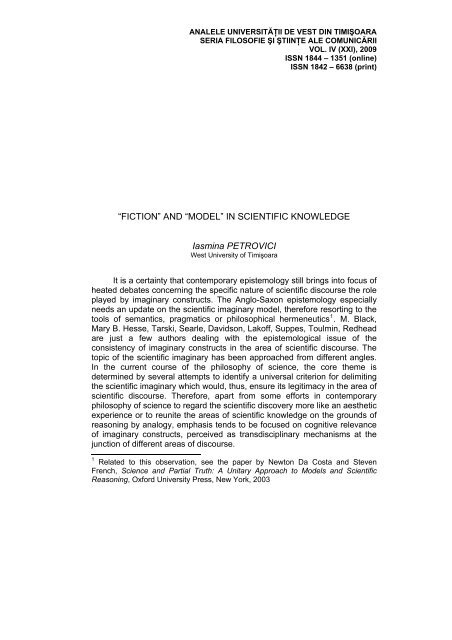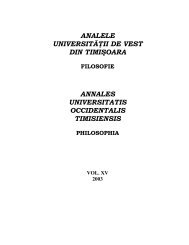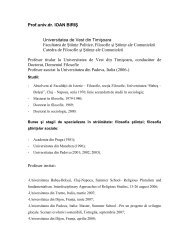VOL. IV (XXI) 2009 - Departamentul de Filosofie si Stiinte ale ...
VOL. IV (XXI) 2009 - Departamentul de Filosofie si Stiinte ale ...
VOL. IV (XXI) 2009 - Departamentul de Filosofie si Stiinte ale ...
Create successful ePaper yourself
Turn your PDF publications into a flip-book with our unique Google optimized e-Paper software.
ANALELE UN<strong>IV</strong>ERSITĂŢII DE VEST DIN TIMIŞOARA<br />
SERIA FILOSOFIE ŞI ŞTIINŢE ALE COMUNICĂRII<br />
<strong>VOL</strong>. <strong>IV</strong> (<strong>XXI</strong>), <strong>2009</strong><br />
ISSN 1844 – 1351 (online)<br />
ISSN 1842 – 6638 (print)<br />
“FICTION” AND “MODEL” IN SCIENTIFIC KNOWLEDGE<br />
Iasmina PETROVICI<br />
West Univer<strong>si</strong>ty of Timişoara<br />
It is a certainty that contemporary epistemology still brings into focus of<br />
heated <strong>de</strong>bates concerning the specific nature of scientific discourse the role<br />
played by imaginary constructs. The Anglo-Saxon epistemology especially<br />
needs an update on the scientific imaginary mo<strong>de</strong>l, therefore resorting to the<br />
tools of semantics, pragmatics or philosophical hermeneutics 1 . M. Black,<br />
Mary B. Hesse, Tarski, Searle, Davidson, Lakoff, Suppes, Toulmin, Redhead<br />
are just a few authors <strong>de</strong>aling with the epistemological issue of the<br />
con<strong>si</strong>stency of imaginary constructs in the area of scientific discourse. The<br />
topic of the scientific imaginary has been approached from different angles.<br />
In the current course of the philosophy of science, the core theme is<br />
<strong>de</strong>termined by several attempts to i<strong>de</strong>ntify a universal criterion for <strong>de</strong>limiting<br />
the scientific imaginary which would, thus, ensure its legitimacy in the area of<br />
scientific discourse. Therefore, apart from some efforts in contemporary<br />
philosophy of science to regard the scientific discovery more like an aesthetic<br />
experience or to reunite the areas of scientific knowledge on the grounds of<br />
reasoning by analogy, empha<strong>si</strong>s tends to be focused on cognitive relevance<br />
of imaginary constructs, perceived as transdisciplinary mechanisms at the<br />
junction of different areas of discourse.<br />
1 Related to this observation, see the paper by Newton Da Costa and Steven<br />
French, Science and Partial Truth: A Unitary Approach to Mo<strong>de</strong>ls and Scientific<br />
Reasoning, Oxford Univer<strong>si</strong>ty Press, New York, 2003




